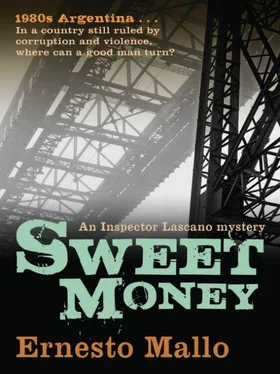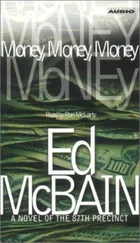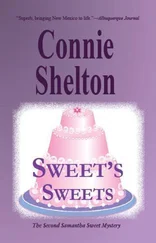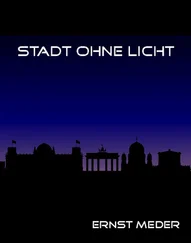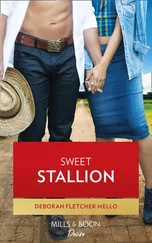Ernesto Mallo - Sweet money
Здесь есть возможность читать онлайн «Ernesto Mallo - Sweet money» весь текст электронной книги совершенно бесплатно (целиком полную версию без сокращений). В некоторых случаях можно слушать аудио, скачать через торрент в формате fb2 и присутствует краткое содержание. Жанр: Полицейский детектив, на английском языке. Описание произведения, (предисловие) а так же отзывы посетителей доступны на портале библиотеки ЛибКат.
- Название:Sweet money
- Автор:
- Жанр:
- Год:неизвестен
- ISBN:нет данных
- Рейтинг книги:5 / 5. Голосов: 1
-
Избранное:Добавить в избранное
- Отзывы:
-
Ваша оценка:
- 100
- 1
- 2
- 3
- 4
- 5
Sweet money: краткое содержание, описание и аннотация
Предлагаем к чтению аннотацию, описание, краткое содержание или предисловие (зависит от того, что написал сам автор книги «Sweet money»). Если вы не нашли необходимую информацию о книге — напишите в комментариях, мы постараемся отыскать её.
Sweet money — читать онлайн бесплатно полную книгу (весь текст) целиком
Ниже представлен текст книги, разбитый по страницам. Система сохранения места последней прочитанной страницы, позволяет с удобством читать онлайн бесплатно книгу «Sweet money», без необходимости каждый раз заново искать на чём Вы остановились. Поставьте закладку, и сможете в любой момент перейти на страницу, на которой закончили чтение.
Интервал:
Закладка:
8
Miranda’s gait reflects his anxiety. One part of him just wants to get it over with, wants to know already, but the other part of him is scared to death. The news about Noelia, Screw’s daughter, plays over and over in his head like a stubborn melody. Then there’s Andres’s eyes… and Villar’s ghost, chiding him at every turn. That pink spot that appeared under his nipple. This morning his eyes were very red when he got up. Maybe it’s the price you pay, he thinks, for a year of buggering a dude, and so much for his excuse that’s it was just for survival, for the release he needed. Maybe he should have been stoical and made do only with masturbating.
He walks through the lobby of the laboratory. When the elevator doors open he finds himself face-to-face with a guy who’s got death tattooed all over him. His dim, sunken eyes seem to be interrogating him. Miranda steps aside at the same moment and in the same direction as the sick man. The action repeats itself until finally they coordinate and each one goes on his way. He no longer has any doubts: this encounter has confirmed his worst fears that he is doomed. Now nothing will have any meaning. His dearth of funds, Noelia’s illness, Duchess and her supposed lovers. In this case, he thinks, everything will boil down to one simple question: should he slash his wrists with a razor blade? As he walks up to the counter where they give out the test results, he thinks about his own funeral and the image of his son standing next to his coffin makes his throat constrict. The beautiful young woman in white attends efficiently to those waiting in line to pick up the results of their tests. When it’s his turn, Miranda feels like his heart is about to explode. The girl hands him the envelope and notices how his hand is shaking. She looks him in the eye and offers him a splendid smile:
No need to worry, sir, if it was positive the doctor would have given it to you personally.
Miranda has a moment of surprise before feeling like the biggest idiot on the planet. But what really pisses him off is that this divine young thing has just called him sir. He’s a new man when he re-emerges on the street and tears open the envelope: Antibodies ANTI-HIV1/ HIV2… Negative (ELISA). He crumples up the piece of paper and throws it in a trash can. It’s a sunny morning and life itself is singing through the streets.
He spends the rest of the day re-establishing contacts, digging around, finding out what people are up to. Who lost, who died, who’s bolted, what’s in the works, and what’s up with the Federal Police, dubbed by themselves in typically modest Argentinean fashion as “the best in the world”. He collects information here and there, patiently gathering facts and more facts, by telephone and in the cafes where the denizens of his world hang out. The panorama starts to take shape in his head, a map of the current situation and future possibilities. On the one hand, he’s angry. For a long time he’d been mulling over the idea of fundamentally changing his life, of starting a legitimate business, something tranquil, of keeping out of trouble, finally giving Duchess the life she’s been wanting for as long as he can remember. Settling down, becoming the family man he thinks he is deep down and welcoming his grandchildren when they come along. Maybe, just maybe, when his time is up, he’ll die peacefully in his own bed. But now that he knows his money has been devoured by Noelia’s illness, none of that will be possible. Not in the short run at least. He’s up a blind alley, and this setback pisses him off. Again he has to resort to a bank job, but the more he thinks about it, the more the anger begins to give way to a quite different sensation. Something akin to vertigo lodges in the pit of his stomach and sends currents of electricity to his muscles, focuses his vision and lets him shake off the last traces of lethargy left over from prison. This heist, he promises himself briefly, will be the last one. It will be the heist to end all heists. Now the world ceases to be merely a place where people are walking past him engaged in their own affairs, attending to their business, going to their dismal little jobs and enacting their tiny ambitions. The Earth is now a game reserve, a free zone where anything is possible. Everywhere transactions are taking place. How much money is there in Buenos Aires on any single day? In people’s pockets, in cash registers, in offices… in bank safes. It’s a simple matter of making a minuscule portion of it land in his pocket. And he’s going to figure out how: choose a target, calculate probabilities, scope out the scene, take measurements, calculate timing, find access and escape routes and carefully choose cohorts. He’ll need brave but not reckless people. Must avoid psychopaths and murderers, find guys who like the good life, not those who enjoy making other people suffer. Killing and violence must be avoided. Intimidation is one thing; murder quite a different one. The dead are expensive, concrete; money, on the other hand, is abstract, worth only what you can buy with it and that’s always in flux. Victims have friends, relatives who adore them, avengers who never forget. Life lost never returns; money can always be recovered. Money can also be given back or used to buy impunity. Death can only be avenged, and if it’s the law that settles accounts, it’s called justice. The only true revenge is the death of the killer. The chain can go on forever. Perhaps if Cain hadn’t killed Abel there’d be no wars today. That’s assuming, of course, that the story actually took place.
He’s made three observations he considers important. One: many police stations are being renovated; they’re surrounded by workers, materials, barriers and containers. Two: many banks are also being renovated; the scene is similar to that at the stations. Three, and this is a real boon: in a few days Independiente play the final match of the Intercontinental Cup against Liverpool in Tokyo. Miranda smiles. Rarely has there been such a favourable convergence. His mind soars as it catalogues each and every detail he must take into account in order to execute a plan that he’s already sketched out in his head.
He walks back to his hideout. He arrives at that uncertain hour when daylight is still in the sky, but at street level it’s already night. He carefully chooses the outfit he’s going to wear and lays it out on the bed. Dark suit, white shirt, a Liberty of London flowery tie, a bit shabby but the flowers are still in bloom. Boxer shorts and cotton socks. He shaves, showers, dries himself off, douses himself in cologne, lies down in bed naked and turns on the television set. He likes to air himself out after bathing. Now he can do it, now that he has begun to enjoy his freedom. He turns on the TV and watches the new Chief of Police giving a press conference. In fact, he’s talking precisely about the plans to renovate the local precinct stations in order to improve public service. The journalist points to a logo on a patrol car that reads: “To serve the community”, which the chief says reflects the new philosophy that must infuse such an institution in a participatory and democratic society. The true change, Mole thinks, is in the way people talk. The language he uses sounds more educated, more refined. The police higher-ups no longer speak in street slang, they’re starting to act more like politicians than policemen. He dozes off. Bernando Neustadt, the TV commentator, wakes him up with his sissy voice. He expresses his disappointment, he misses the iron fist of the armed forces. Miranda turns off the TV. He gets up and gets dressed. It’s time to take his final exam, and he feels like he knows the material backward and forward.
From the shadows across the street he watches the students of Lia’s Art Studios leave the building and walking away in groups of twos or threes, carrying their portfolios under their arms. Mole looks at his watch. It’s a little after ten at night. He waits two minutes, crosses the street and enters the building. From the foyer he can see Lia, who has not yet noticed his arrival. She has an asymmetrical haircut with a quiff of shocking-red hair falling over half her face. She’s got a great body, and her lily-white skin is not marred by a mole, a freckle or even a spot, according to his memory of her body from very close range. Nobody would guess that this tiny woman is as powerful as a locomotive when she makes love. Miranda smiles with satisfaction; he feels his sex getting restless. Her unconditional loyalty to him seems a lot like love but also contains a good dose of gratitude, a rare virtue Mole values highly. He convinced her to give up prostitution, paid for her to take classes with a painter with an unpronounceable name, whom everyone called Bear, set her up in the studio and bought the equipment that allowed her to become what she is now, what she calls a plastic artist. Miranda thinks this is funny because, as far as he can tell, this girl hasn’t a touch of plastic about her. Lia’s charm sells more paintings than her brush and as a born survivor on her way to fame and fortune, she knows quite well how to deploy her virtues to their full advantage. Just as Lia starts to take off her apron, she sees him. She looks surprised, then freezes, then shoots him a sidelong glance out from under that cute red quiff. Then a smile, unreserved and also bright red, spreads out like a curtain to reveal a vaudeville of teeth, restless tongue and shining eyes.
Читать дальшеИнтервал:
Закладка:
Похожие книги на «Sweet money»
Представляем Вашему вниманию похожие книги на «Sweet money» списком для выбора. Мы отобрали схожую по названию и смыслу литературу в надежде предоставить читателям больше вариантов отыскать новые, интересные, ещё непрочитанные произведения.
Обсуждение, отзывы о книге «Sweet money» и просто собственные мнения читателей. Оставьте ваши комментарии, напишите, что Вы думаете о произведении, его смысле или главных героях. Укажите что конкретно понравилось, а что нет, и почему Вы так считаете.
